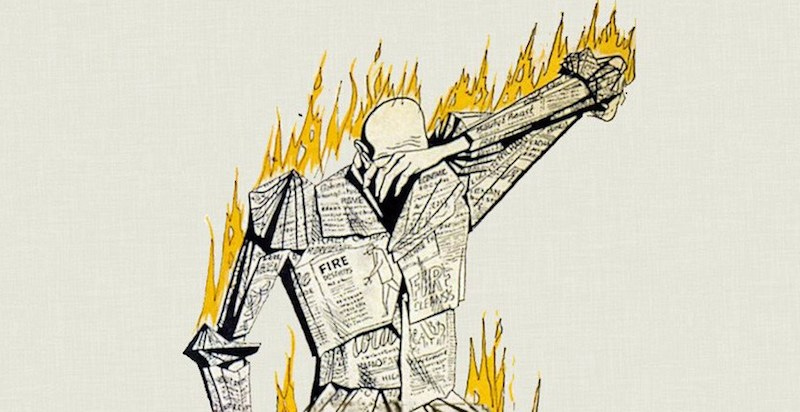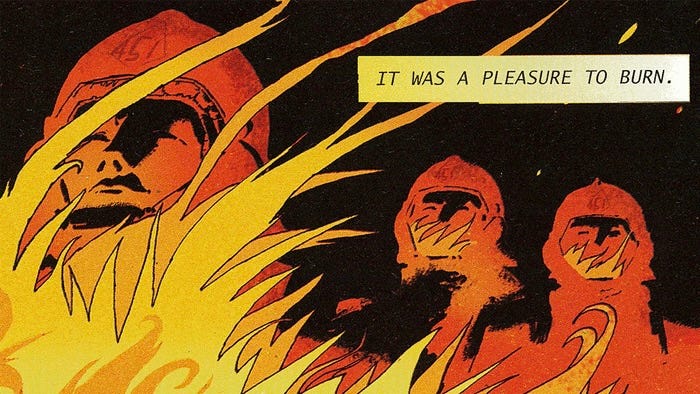What Happens When Society Stops Reading?
And how to guard your mind from decay
You don’t have to burn books to destroy a culture. Just get people to stop reading them.
-Ray Bradbury
The dystopian world of Ray Bradbury’s Fahrenheit 451 is anything but alien. It is recognizably our own, with all our modern shortcomings accelerated to their logical ends.
The citizens of this world are not oppressed in the traditional sense, but entertained into submission. They live in houses surrounded by screens, speaking endlessly and saying nothing. They move too quickly to think. Constant stimulation keeps them from ever developing a rich interior life, and they fear few things more than silence.
What Bradbury described in his 1953 novel has become an eerily precise mirror of the present: a society overfed on information, yet starving for meaning. But despite the book’s focus on the role of the “firemen” — squads of men sent out to burn books — Bradbury makes it clear that it’s not because of book burnings that society has decayed.
Instead, it’s because the people themselves decided to stop reading. Today, we look at what happens in the world of Fahrenheit 451 when adults put down their books for good, and why it’s a haunting premonition for what might soon happen to us…
Reminder: this is a teaser of our members-only deep dives.
To support our mission and get exclusive content every single week, upgrade for a few dollars per month. You’ll get:
Full-length articles 2x per week
The entire archive of premium articles and podcasts
Membership to our bi-weekly book club (+ subscriber chat room)!
Our paid subscriber Great Books Club is currently reading Dostoevsky’s “Notes from Underground”. The next meeting is on Wednesday, October 22, noon ET — join us!
The Age of Distraction
In Bradbury’s imagined future, books became obsolete long before they were banned. The process first began when the public grew tired of nuance, preferring headlines and summaries to actual stories. In time, the government capitalized on this apathy, and simply formalized what the people had already chosen.
Today, however, we have no need for book burning squads: our devices more than suffice. As a steady stream of news, notifications, and short-form content consumes your attention, your ability for sustained thought steadily corrodes. The mind begins to mistake online “takes” for well-formed philosophies, and mental overstimulation makes it tempting to replace reasoning with reaction.
Bradbury understood this tendency long before the digital age, and pointed out that technology itself doesn’t have to be evil — it just has to be a sufficient distraction. The home of Guy Montag, Fahrenheit 451’s protagonist, is filled with enormous, immersive screens on nearly every wall to ensure constant stimulation. The government he lived under knew that when every moment in a person’s life is filled, reflection becomes unnecessary…
The Hollowing of the Self
It was a pleasure to burn. It was a special pleasure to see things eaten, to see things blackened and changed…
In Fahrenheit 451, Guy Montag begins as a contented participant in this emptiness. He burns books without question, repeating the slogans of his profession. But then a chance encounter with a young woman named Clarisse, whose curiosity and wonder contrast sharply with his mechanical life, awakens in him the sense that perhaps something essential has been lost.
This awakening is the central drama of the novel. Montag’s rebellion begins with a subtle hint of unease, and slowly snowballs as he comes to realize he has no interior life. His thoughts are not his own, and his emotions are manufactured — here, Bradbury is critiquing popular consumer culture just as much as he is the decline of reading.
What comes across is the idea that when a society stops reading, it doesn’t just lose access to knowledge and great stories. The greatest thing it loses is in fact access to selfhood, for reading is a form of introspection. Reading anything meaningful requires patience and solitude, and demands that you suspend the noise of your mind long enough to listen to what the author has to say.
But in the absence of such a practice, interiority collapses. People begin to fear silence, because silence exposes the void within them. They consume images instead of ideas, and sentiment instead of understanding: in other words, they inhabit the very world Montag does before his transformation.
Bradbury understood that, once deprived of depth, your mind is quick to mistake motion for life. It keeps itself busy to avoid confronting the emptiness it has created, and slowly deteriorates in the process. But if this is the disease, what’s the cure?
Fortunately, we see this play out in the life of Guy Montag himself — for as he revolts and flees from his dystopia, he reveals the key to guarding your own mind from decay…
Keep reading with a 7-day free trial
Subscribe to The Culturist to keep reading this post and get 7 days of free access to the full post archives.







